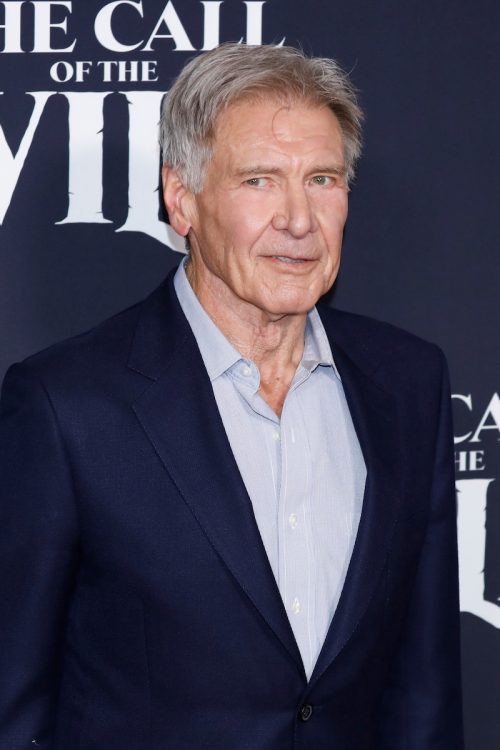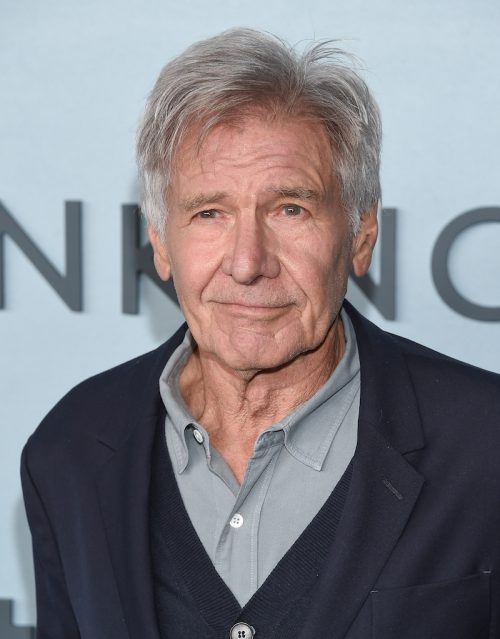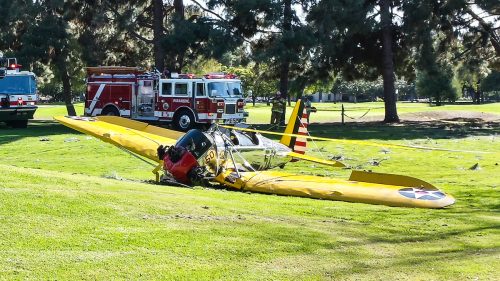Eight years ago, Harrison Ford was in a plane crash that could have ended his life. And while the experience did lead to some changes, it didn’t stop the actor from flying planes, which he still does today. He recently explained that, because he knows what went wrong during the crash, he felt comfortable getting up in the skies again.
Ford opened up about the crash in a new interview with The Hollywood Reporter, in which he also talks about his roles on the TV shows 1923 and Shrinking and in the upcoming fifth Indiana Jones movie, as well as his philosophy on life. Read on to see what the 80-year-old star had to say about the crash, his recovery, and how he resumed pursuing his passion.
READ THIS NEXT: This Is Why You Never Hear From Robert Redford Anymore.
In March 2015, Ford crashed a vintage World War 2 era plane onto a golf course in Santa Monica, California. As reported by USA Today, the actor contacted air traffic controllers and reported engine failure before crash-landing the single-engine plane.
“Harrison was flying a WW2 vintage plane today which had engine trouble upon take off. He had no other choice but to make an emergency landing, which he did safely,” his publicist said in a statement. “He was banged up and is in the hospital receiving medical care. The injuries sustained are not life threatening, and he is expected to make a full recovery.”
USA Today later reported that an investigation from the National Transportation Safety Board found that a problem with a carburetor part caused the engine failure.
Ford was also involved in a helicopter accident in 1999, but it didn’t cause injuries to him or his instructor.
Ford shared the extent of his injuries during a December 2015 interview with Ellen DeGeneres. He said that he suffered “a dislocated right ankle, a shattered pelvis, and a broken back, and a serious bump on the head with a major laceration.” He jokingly added, “Other than that, nothing.”
For more celebrity news delivered right to your inbox, sign up for our daily newsletter.

Ford appeared on Jimmy Kimmel Live! in October 2015 and explained that he didn’t remember anything from after the crash happened and the five days following it.
“I remember the engine stopping, I remember that part very well,” the Blade Runner star said (via THR). “And then I remember telling the tower what I was going to do. And then I remember their suggestion. Their suggestion was that I take the normal route to land and I knew I wasn’t going to do that, so I said no … And that’s the last thing that I remember until five days afterwards, actually.”
“I’m told by the doctors that the amount of general anesthetic that I got induced a retrograde amnesia,” he added.

In his new interview with THR, Ford was asked whether coming close to death changed anything for him when it comes to flying. He said that his wife, Calista Flockhart, will no longer fly with him in certain circumstances.
“I changed a lot of things in my life. My wife does not fly with me in vintage airplanes anymore—she will in others,” Ford said. “I certainly don’t want to have to recover from that kind of accident again. It was really hard on my family and it was hard on me.”

Ford explained that the crash landing didn’t prompt him to give up piloting, because he knows how to avoid being in a similar situation again.
“I know what happened. So that’s part of the reason [I went back],” he said. “There was a mechanical issue with the airplane I could not have known about or attended to in any way. So in the words of the great philosopher Jimmy Buffett: [Expletive] happens.”
Asked if he finds it even scarier that he didn’t have control over the issue, Ford responded, “Well, you never do anything perfect. That’s a dangerous concept. So you’re always looking to see what you did. Flying is especially like that. After every flight, you can analyze the flight and say, ‘Remember when I did that? That was a rookie mistake.'”

